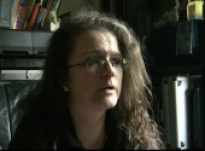Kirsty - Interview 12

Kirsty was sexually abused as a child; then had 'strange symptoms' when managing a shop. She has been in hospital after having hallucinations and tries 'creative visualisation' to control them, along with her medication. She has had long battles with various addictions.
Kirsty is a volunteer with Rethink and a local housing organisation; she is single with no children. Ethnic background: White British.
More about me...
Kirsty experienced tactile hallucinations, feeling that people were poking her. She experienced abusive language and ‘abstract pains’ or feeling like she was being beaten up. She now combats this with a technique called ‘creative visualisation’ with the help of a counsellor. When she was being sexually abused she used to pretend she was ‘dead’ or ‘not there’ in order to cope, and it is a similar survival mechanism that helped with the hallucinations. Her voices ‘completely disappeared’ at one point, but she has had a ‘rumbling voice’ or a ‘crystal clear’ voice; she commonly hears a voice from the Hoover. Quite often the voices are ‘slightly ambiguous’, saying either ‘I will kill you’ or ‘I can heal you’. She has had experience of illegal drugs and didn’t look after her ‘physical health’ at various stages. She had mixed experience of psychiatric care, with one psychiatrist commenting on her promiscuity (which she feels is the result of sexual abuse), saying ‘Oh, so you’re not scared of the sight of a stiff prick then?’. Kirsty feels there is better awareness of sexual abuse in the services now. The nursing staff she has had were ‘absolute angels’, but the psychotherapist she was seeing ‘fell asleep’ or ‘picked his nose’. However, the people she has had contact with recently are ‘much better suited’ to that kind of work. She thinks that the things that have helped her well-being are ‘sticking to her medication’ and not worrying what other people think. Sometimes she has benefited from ‘kind voices’ as well, reminding her to take her medication. She is due to start some specialist counselling on rape and sexual abuse in a couple of months’ time. Kirsty can ‘relax and be herself’ with her mum. She tries not to take things ‘too seriously’ and has got involved with different committees. Kirsty enjoys having an active imagination and the feeling of being able to ‘give back’. She credits voluntary work with helping to build her confidence up as she was a ‘wreck’.
Kirsty worked in a music store, but wasn't confident in her social life. She went to her GP with physical symptoms but he could find nothing wrong with her.
Kirsty worked in a music store, but wasn't confident in her social life. She went to her GP with physical symptoms but he could find nothing wrong with her.
And eventually my work life began to suffer as well, and I actually thought I was dying. I was getting a lot of strange symptoms. And I was backwards and forwards to the doctor, and that, and getting different tests done. And then he I’d gone in there one day and he said, “Oh, you know, there’s… you’re absolutely fine, there’s nothing wrong with you.” And I just exploded. And that. So he said, “Right, now I’m sending you to see a psychiatrist.” Sort of thing. And that was me in with the mental health service sort of thing.
Kirsty said that her voices can be useful and kind, like the time they reminded her to take her medication when she couldn't remember.
Kirsty said that her voices can be useful and kind, like the time they reminded her to take her medication when she couldn't remember.
And sometimes you get extremely kind voices as well. I got reminded to take my medication when I came out of hospital at one point. I was having difficulty, I didn’t have a, a proper system for sorting out my medication, and I saw a friend of mine on the bus, and he was going up to the psychiatric unit to see some friends, and he was like, “Oh hi. How you’re doing?” I said, “Yes, fine. But I keep forgetting to take my medication and that.”
And I suppose that was half past one, two o’clock in the afternoon. Around came 5 o’clock and I got in my head the voice, ‘medication’, which was the call at the hospital at 5 o’clock for people to come and queue up for medication, you know, so, they can be, you know, that’s a really practical salvation as well. But they can boost your confidence or whatever, you know. Sometimes obviously they can boost it a bit too much and you get on your high horse, but you know, they can be extremely useful and kind and helpful as well, yes.
Kirsty's problem with alcohol led her to being promiscuous which she now feels is a form of self-harm.
Kirsty's problem with alcohol led her to being promiscuous which she now feels is a form of self-harm.
Kirsty used a technique called 'creative visualisation' to relax and to protect herself from unpleasant voices and experiences.
Kirsty used a technique called 'creative visualisation' to relax and to protect herself from unpleasant voices and experiences.
Just going off in my head, trying to find somewhere safe to be, sort of thing, you know, because I don’t know, if a, a real person, flesh and blood is bothering you know, you can take yourself away from them, or you know, send them out the door or whatever you know, but if it’s things that you can’t physically remove and that, you know, if they’re just, not exactly in your head, but if they’re, they’re not, then it’s difficult to say they’re not real, because they are pretty much real when it’s happening sort of thing, you know, but…. I was, just, I thought, yes, you know, I can get myself out of this by pretending.

